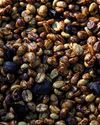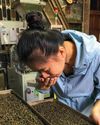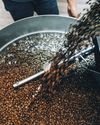A lack of access to quality wet mills can hamper the production of speciality coffee. But, as Phil Wain discovers, there are solutions

You may not have heard of wet milling, but it is a crucial process in the production of high-quality washed coffee. Harvested coffee cherries are fed into a pulping machine, which separates the bean from the fruit that surrounds it. The beans are sorted and then kept for anything from eight to 72 hours in fermentation tanks, where the sticky mucilage around the coffee beans is broken down. The beans are then washed to remove the mucilage; this washed coffee is known as parchment.
Parchment is slowly dried – often on raised beds – while workers continually turn it in the sun. There is also a later stage – dry milling – when the last layers of dry skin are removed from the parchment coffee as it is cleaned and sorted before being shipped.
Of course, this is a generalisation – the process varies from region to region and country to country. But on the whole it is a large scale industrial process carried out by cooperatives, exporters or service providers.
Poor access
Access to good wet mills is a major factor in improving the quality of coffee and coffee farmers’ income. If we want quality coffee where the farmer has access to adequate processing of the picked coffee and full traceability, we need coffee growers to have access to decent wet mills. But unfortunately in many parts of the coffee growing world, good mills are scarce and/or inaccessible.
This story is from the April - May 2018 edition of Caffeine.
Start your 7-day Magzter GOLD free trial to access thousands of curated premium stories, and 8,500+ magazines and newspapers.
Already a subscriber ? Sign In
This story is from the April - May 2018 edition of Caffeine.
Start your 7-day Magzter GOLD free trial to access thousands of curated premium stories, and 8,500+ magazines and newspapers.
Already a subscriber? Sign In

The Future Of Decaf?
A US company claims its pouch extracts caffeine without harming flavour

Great Coffee Shouldn't Cost The Earth
Caffeine’s editor-at-large Tim Ridley explains how to lower the environmental impact of your coffee-drinking habit

What The F**k...Is Honey Processing?
Apart from natural and washed coffees sits a whole other category, as Sierra Wen Xin Yeo explains

The grind
SEASONAL COFFEE

Tea with purpose
Michelle and Rob Comins explain how tea can be a force for good

Ten years on
We celebrate the London Coffee Festival’s first decade with a look at its successes

Chocolate and espresso pavlova with fennel roasted grapes
This year I’m giving coffee centre stage on the Christmas dessert table. I firmly believe coffee shouldn’t just be an afterthought to accompany dessert, it should be the dessert – but aside from that, it just makes sense.

Bitter Barista
Latte art competitions have been milking it for too long – they used to be fun, but now their focus on the wrong things is harming barista skills, says our cantankerous columnist

What The F**k ...Is The Maillard Reaction?
It’s just one of the elements you need to know about if you’re going to roast coffee successfully, as Edgaras Juška explains

Work Wonders
Coffee gets people through the working day. So it stands to reason that better coffee produces better work – and in some places the two are in perfect harmony, says Phil Wain